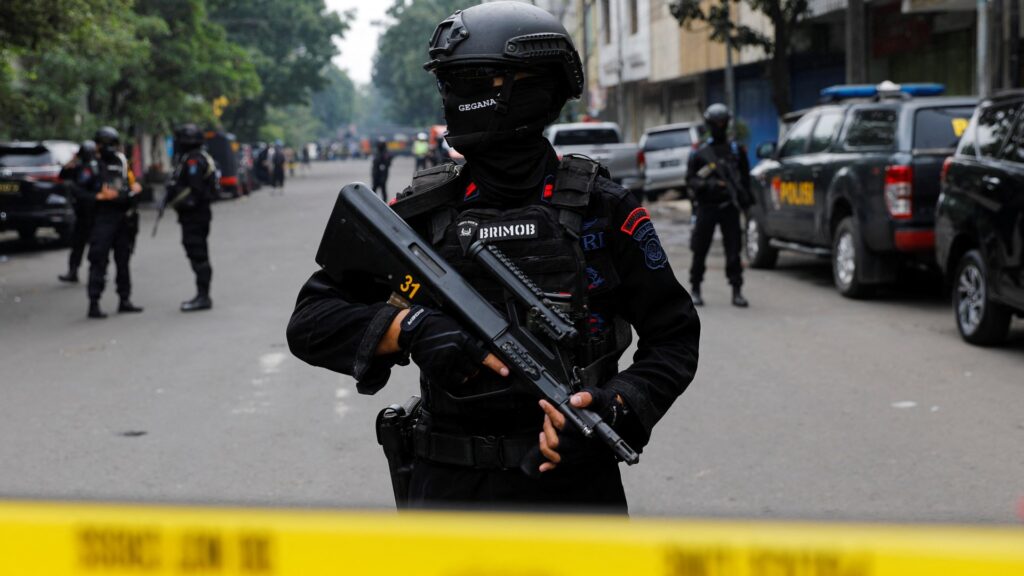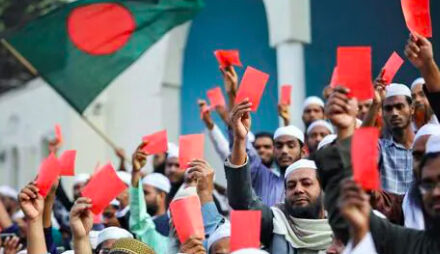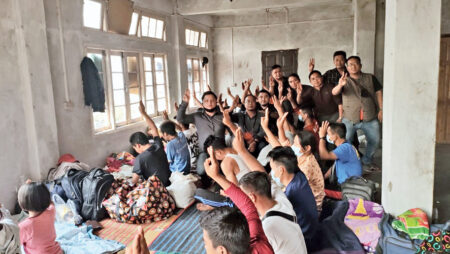MANTRAYA ANALYSIS#69: 09 AUGUST 2023
Indonesia’s Preventing/Countering Violent Extremism Effort: Does going ‘soft’ work?
BIBHU PRASAD ROUTRAY
Abstract
Indonesia’s C/PVE approach, combining conventional anti-terrorism measures and the soft counter-radicalization and using former terrorists as anti-extremism messengers is delivering results. Extremism-related incidents have been reduced significantly. Although by no means is the threat over, the Indonesian success is something others can note and examine.

Introduction
The last reported terror attack in Indonesia occurred on 7 December 2022, when a male on a motorcycle blew himself up at the Astana Anyar police station on Indonesia’s main island of Java. An officer was killed, and six police personnel and a civilian were injured. The suicide bomber entered the police station and detonated his vehicular-borne explosives as the police were lining up for morning assembly. A paper taped to the motorbike read, “Criminal code is the law of infidels, let’s fight the satanic law enforcers.” The attack took place a day after Indonesia’s Parliament passed a new criminal code that bans sex outside of marriage, as well as insulting the president and state institutions.
Pattern & Trend analysis
Since bombings on the resort island of Bali in 2002, which killed 202 people, mostly foreign tourists, Indonesia has battled both local Islamist outfits and those linked to global terror formations such as al-Qaeda and the Islamic State (IS). According to a January 2022 report by the National Counterterrorism Agency (Badan Nasional Penanggulangan Terorisme, BNPT), more than 2,150 Indonesians traveled to Syria and Iraq to join IS between 2013 and 2017. Of those, more than 555 were deported before they entered Syria, 194 voluntarily returned home, and 127 were confirmed dead.
In recent years, attacks aimed at foreigners have primarily been replaced with smaller, less deadly strikes targeting the government, police and anti-terrorism forces, and people whom militants consider infidels. Almost all of these actions have either been carried out by radicalized individuals or members of the terrorist group, Jemaah Anshorut Daulah (JAD),[1] which has pledged allegiance to IS.
JAD, led by jailed radical cleric Aman Abdurrahman,[2] has been linked to several deadly incidents, including a 2016 gun and suicide attack in the capital, Jakarta, that left four attackers and four civilians dead. It was the first assault claimed by IS in Southeast Asia. In May 2018, 13 suicide bombers belonging to two families carried out a series of suicide bombings on churches in the city of Surabaya, killing 12 people.
In November 2019, a suicide bomber blew himself up at a busy police station in Medan, Indonesia’s third-largest city, injuring at least six people. A month earlier, in October, a suspected Islamist stabbed and wounded Wiranto, Indonesia’s former security minister, after he had opened a university building. In March 2021, two JAD attackers blew themselves up outside a packed Roman Catholic cathedral during a Palm Sunday Mass on Sulawesi island, injuring at least 20 people.
Specter of instability & radicalization
Although these attacks seem to portray a specter of instability fueled by widespread radicalization across the country, the number of terror attacks actually has declined since 2018. That year, 19 terror attacks took place in the country. However, the number of attacks was just 11 each for 2019 and 2020, and then only six in 2021. In 2022, two attacks took place, including the suicide attack in Java.
The reason for such success is partly due to a consistent effort to arrest terror suspects, which removes the vector for the attacks, i.e. the potential attackers. In 2018, 396 terror suspects were arrested, which represented a 117 percent rise over previous years. Between 2019 and 2022, another 1121 suspects were arrested, including 247 in 2022.
These steps are part of Indonesia’s institutionalization of Preventing/Countering Violent Extremism(P/CVE), which lays equal emphasis on the traditional methods of countering terrorism through capacity building among the forces and augmenting intelligence, together with softer methods integral to deradicalization.
Case of Umar Patek
An apt example of this ‘soft’ P/CVE is Indonesia’s decision to release Umar Patek, one of the key terrorists who participated the Bali bombing in 2002, on parole in December 2022. Patek was accused of being a bombmaker for Jemaah Islamiah (JI) , a group inspired by al-Qaeda, and spent almost a decade on the run before his capture in Pakistan’s Abbottabad in 2011. The United Nations lists him as being associated with al-Qaida for ‘participating in the financing, planning, facilitating, preparing, or perpetrating of acts or activities by, in conjunction with, under the name of, on behalf of, or in support of,’ ‘supplying, selling or transferring arms and related materiel to,’ ‘recruiting for,’ or ‘otherwise supporting acts or activities of’ JI and Abu Sayyaf Group in the Philippines.[3] It states directly, ‘Patek was personally involved in assembling the van bomb and explosives used in the Bali attack.’[4] Some 202 people from 21 nations were killed in the blasts on 12 October that year. It remains Indonesia’s deadliest terror attack. Patek was extradited to Indonesia and sentenced to 20 years in prison in 2012.
However, with half of his sentence still remaining, the Indonesian authorities said that Patek had been deradicalized. According to their assessment, ‘He no longer poses a threat and is eligible for release after a series of sentence reductions for good behaviour.’[5] The Indonesian government ignored the anger expressed by a number of countries, particularly Australia, home to 88 of the victims. The Australian government lobbied against Patek’s release and demanded that Indonesian authorities impose constant surveillance of him. In response, Indonesia’s Ministry of Law and Human Rights said that after his release Patek is required to join a ‘mentoring programme’ until April 2030. If any violation is discovered during that time, his parole will be revoked.[6]
For a country owing its augmented counter-terrorism capacity to sustained Australian and American support and cooperation since the Bali bombing, releasing Patek was a huge step. Barely two months before Patek’s release, in October 2022, Australia and Indonesia had jointly commemorated the 20th anniversary of the Bali Bombings.[7] But this is reflective of the country’s continuous pursuit of a comprehensive P/CVE policy in spite of a rather high 11 percent recidivism rate. According to a study by a Jakarta-based think tank, among a total of 825 men and women convicted of terrorism and released between 2002 and May 2020, 94 were repeat offenders.[8]
The Indonesian official perspective, however, is distinct. It takes credit for converting nearly a dozen former terrorists into prominent deradicalization advocates. These persons, some of whom are still behind bars, have carved out niche roles for themselves in the country’s wider efforts to confront religious extremism. Ali Imron, who assembled and transported the explosives used in the Bali bombings, is one such example. From his cell, he uses his persuasion skills to spread the word against terrorism. He is allowed to visit schools and participate in television programmes.[9] Although he so far has not been released, Imron, like Patek, has become central to Indonesia’s P/CVE approach – which, it must be noted, has not found many takers globally.
Upgrading to P/CVE Plus
In fact, BNPT maintains that the declining trend in terror attacks is merely the tip of the iceberg and that there is no room for complacency even while terror incidents are few. It assesses that terrorism in Indonesia is shifting its focus to exploit the growing popularity of radicalism in some circles. BNPT chief Rycko Amelza Dahniel observes, ‘(Terrorist) groups have begun to shift their approach from hard to soft approach, and from bullet strategy to ballot strategy.’ For instance, Hidayat Nur Wahid, speaker of the People’s Consultative Assembly (Indonesia’s highest legislative body), has been one of the most outspoken defenders of Abu Bakar Bashir, the spiritual head of JI.[10] The Justice Party of which Nur Wahid is a former head is the seventh largest party in the country’s parliament.
To meet this threat, BNPT in July 2023 launched four publications (referred to as knowledge products by BNPT) in the form of results of analyses and studies related to countering violent extremism: I-KHubBNPT Counter Terrorism and Violent Extremism Outlook, K-Hub PCVE Outlook, Mid-Term Evaluation of the National Action Plan on Prevention of Extremism (RAN PE), and Analysis of Local Government Readiness to Implement RAN PE. BNPT seeks to make these four publications the basis for follow-up discussions on C/PVE in Indonesia.
While BNPT seeks to highlight its humanization programme to rehabilitate terrorists – not just for debate and discussion within Indonesia but also as some sort of model for replication in other countries of Southeast Asia – its programme’s and achievements have received criticisms from those such as Nur Wahid. He refers to the increasing budget of BNPT and asks why attacks such as the one in Java in December 2022 could not have been prevented. Other Indonesian watchers question the lack of coordination between various Indonesian agencies who work on deradicalization simultaneously.
The fact remains, however, that the journey of Indonesia since 2002 has been substantial. In spite of the impact of global jihadism on its population, which resulted in the large numbers cited above seeking outlets in Iraq and Syria, together with a wave of radicalization, the country’s agencies concerned with countering terrorism have been able to keep incidents under control.[11] Indonesia has indeed emerged as a success story for others to examine.
END NOTES
[1] “What is JAD? Terror group behind Mako Brimob riot, Surabaya bombings”, Jakarta Post, 14 May 2018, https://www.thejakartapost.com/news/2018/05/14/what-is-jad-terror-group-behind-mako-brimob-riot-surabaya-bombings.html.
[2] In June 2018, Aman Abdurrahman was found guilty and sentenced to death on charges that he incited five deadly attacks in the country in 2016 and 2017, while he was in prison on an earlier terrorism conviction. At that time of sentencing, Abdurrahman was 46 years of age. In January 2017, the U.S. government designated Aman a “global terrorist,” alleging he had founded JAD, composed of two dozen pro-IS groups.
[3] United Nations Security Council, ‘Umar Patek’, 22 September 2017, https://www.un.org/securitycouncil/sanctions/1267/aq_sanctions_list/summaries/individual/umar-patek.
[4] Ibid.
[5] Tiffaniw Turnbull, “Umar Patek: Anger and fear in Australia as Bali bomber freed”, BBC, 8 December 2022, https://www.bbc.com/news/world-australia-63883431.
[6] “Indonesia releases on parole Bali bomb maker Umar Patek – statement”, Reuters, 7 December 2022, https://www.reuters.com/world/asia-pacific/indonesia-releases-parole-bali-bomb-maker-umar-patek-statement-2022-12-07/.
[7] Department of Foreign Affairs and Trade, Australian Government, ‘Commemorative services to mark the 20th anniversary of the 2002 Bali bombings’, October 2022, https://www.dfat.gov.au/international-relations/commemorative-services-mark-20th-anniversary-2002-bali-bombings
[8] “In Indonesia, 11 Percent of Former Terrorists Are Repeat Offenders, Study Says”, Benar News, 9 April 2020, https://www.benarnews.org/english/news/indonesian/200904-ID-terrorism-recividism-09042020194441.html.
[9] Aisyah Llewellyn, “Man behind Bali bombings tries to stop terrorists — and wants freedom”, Washington Post, 19 November 2022, https://www.washingtonpost.com/world/2022/11/19/indonesia-bali-bombing-deradicalization/.
[10] “And Now, Ballots Not Bullets…”, Outlook, 3 February 2022, https://www.outlookindia.com/website/story/and-now-ballots-not-bullets/229450.
[11] Useful background at Wibawanto Nugroho, Understanding the Existence and Latent Threat of Islamist Terrorism Through a MultiDimensional Analysis: The Case of Republic of Indonesia, PhD dissertation, University of Exeter, UK, https://media.proquest.com/media/hms/PFT/2/kXjsR?_s=RcqzgKY%2FH3KOzlsGJ6A3jA7W04M%3D.
( Dr. Bibhu Prasad Routray is the Director of Mantraya. This analysis has been published as part of Mantraya’s ongoing “Mapping Terror & Insurgent Networks”, and “Fragility, Conflict, and Peace Building” projects. All Mantraya publications are peer-reviewed.)
To read previous Mantraya Analyses CLICK HERE


